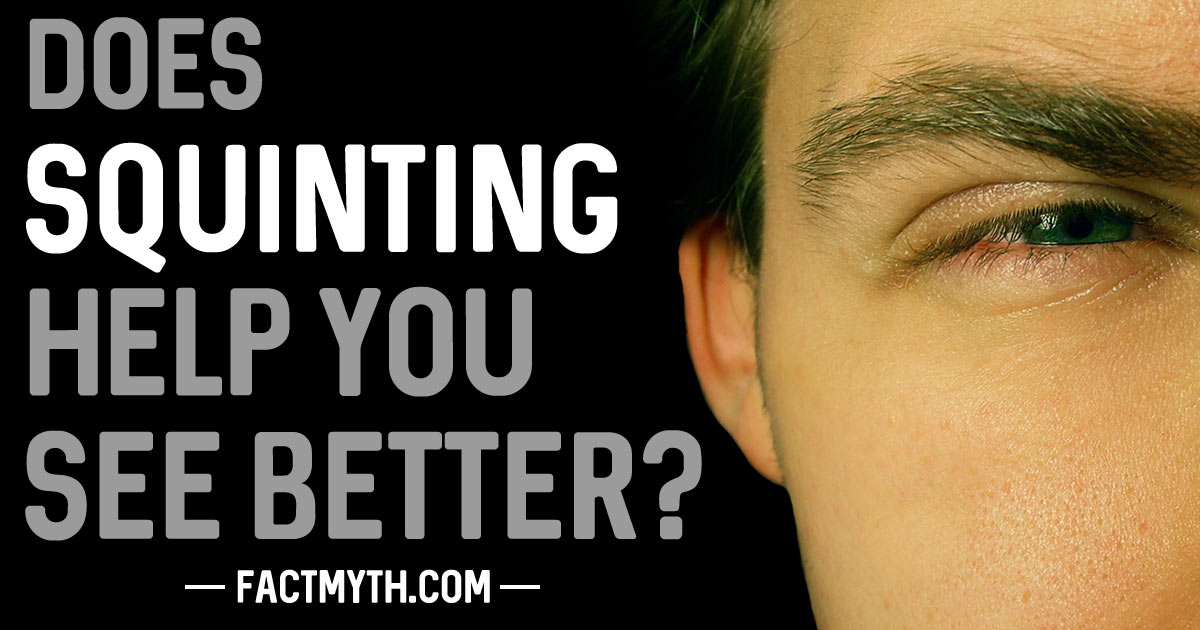Squinting wont hurt your vision, but can lead to headaches and wrinkles. So if you are one of the many people caught in the habit, do your eyes a favor and get some glasses or contacts.
Squinting Helps Vision fact

Do People See More Clearly When Squinting?
Squinting helps to improve vision, at least temporarily, by allowing less light into the retina allowing us to focus our eyesight more easily. Squinting can also cause headaches and wrinkles over time. Given this, it is better to address issues related to vision with an optometrist rather than relying on squinting.
Why Does Squinting Seem to Improve Vision?
When we squint, we use our face muscles to change the shape of our eyes to allow less light into the retina enabling us to focus more easily.[1]
TIP: See Harvard.edu for an in-depth look at “how vision works”.
What Causes People to Squint?
When light hits the eye, light rays go in all different directions. The rays first hit the cornea; it directs the light to the center of the eye. The light then travels through the iris, which uses muscles to expand or contract the window that allows light to enter the eye. Light goes through the cornea, a lens similar to a camera’s. As you get older, the cornea slowly hardens and resists changing shape on its own. Squinting allows people with misshaped corneas or weakened eye muscles to adjust the shape of their eyes and control the amount of light that enters. Squinting helps us to focus on the object that we are trying to see, without allowing so much of the light around us to get into the eye.[2][3]
Does Squinting Worsen Vision?
Although squinting hasn’t been proven to weaken vision over extended periods of time, it does have its downfalls. Squinting takes a lot of facial muscles that if used too much can lead to headaches or migraines. Another side effect of squinting is that it can cause wrinkles or “crow’s feet” around the eyes. So although it doesn’t make your vision worse, squinting is a good sign that you need to get your eyes checked.[4]
Light Sensitive Squinting
People are born with all sorts of different visual capabilities and defects; some people’s eyes allow too much light into the retina, or they have highly sensitive retinas. Squinting is a standard response to limit the amount of light reaching the retina. Lights, which are used everywhere, are painful to eyes unless people can limit the light in some manner. Light sensitive patients often report having migraines, caused by squinting, and are told to have low leveled lighting at their house and to wear dark sunglasses when going out in public.[5]
Squinting with Glasses
If you use of glasses and notice yourself trying to squint through them, it may be time for a new pair. With or without glasses your eyes will slowly get worse as you age, because of this it is beneficial to go to the Optometrist yearly and get your prescription adjusted.
Athletes Squinting
Even though they’re built to play at the highest physical condition, athletes don’t always have the best eyesight. Jameis Winston, a quarterback for the Tampa Bay Buccaneers, has been caught squinting on the field while trying to get plays from the sideline. Winston does have contacts but says they bother him, and that squinting has just become a habit for him. People claim that Jameis’ squinting doesn’t affect how he plays, but Steven A. Hitzeman, an associate professor at Indiana’s School of Optometry, says otherwise. Hitzeman says, “Visual acuity is a strong predictor of performance,” and “I would make sure he’s wearing correction when he plays” –Hitzeman[6]
The video below shows examples of Jameis Winston squinting, and how it affects his playing.
- “Why can people see more clearly when they squint their eyes?” Scienceline.ucsb.edu
- “How Does The Human Eye Work?” Nkcf.org
- “Eyesight: The effect of age” News.bbc.co.uk
- “Doctors Explain the Truth Behind 11 Popular Eye Myths” Abcnews.go.com
- “Causes of Eye Squinting” Livestrong.com
- “Jameis Winston: Squinting is ‘a habit.’” Espn.go.com
